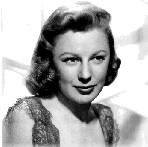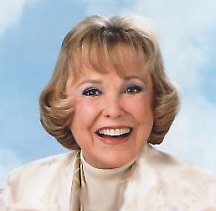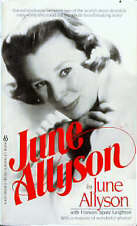|
      


In the entertainment world, those who are truly outstanding and become
superstars are the performers who are "originals," that is they possess a talent
or unique personality that sets them apart from their contemporaries. Garbo, Harlow,
Bogart, Davis, Gable, Garland and Hepburn are all prime examples of such artists. June
Allyson certainly occupies a place on this list. Her instantly identifiable husky voice,
outgoing charm and appeal and utter naturalness combine to create a personality and an
image that holds unforgettable appeal to audiences.
From her earliest childhood, June Allyson (born Ella Geisman in New York) was enchanted
with the world of show business. Following a serious accident as a child which injured her
back, doctors feared she might be left crippled. An avid fan of Fred Astaire and Ginger
Rogers musicals, she viewed one of their films 18 times and began to teach herself how to
dance. This, along with her other love, swimming, served as major parts of her
recuperative therapy. She would practice dance steps at home by herself for hours on end.
She eventually not only recovered completely, but became an expert dancer in the process.
After boasting that she could dance just as well as Ginger Rogers to the kids in her
neighborhood, she was dared to go audition for a Broadway show, which she did. She walked
into the audition not knowing what to do, but whatever she did was good enough for her to
be called back and eventually get hired for her first professional appearance in the
chorus of "Sing Out the News," a Rodgers and Hart musical. After that show, she
was cast in "Very Warm for May," a Jerome Kern and Oscar Hammerstein musical,
which also gave impetus to the career of the then unknown Vincente Minnelli. Upon the
closing of that show, June returned to high school just in time for final exams and
graduation.
Undecided as to whether to pursue a theatrical career or to give in to a strong desire to
study medicine and become a doctor, June continued to accept offers for Broadway shows to
earn money to finance her medical ambitions. She was cast in the show "Higher and
Higher," another Rodgers and Hart musical with Jack Haley and then "Panama
Hattie," a Cole Porter musical with Ethel Merman and Betty Hutton, where she
understudied Ms. Hutton. Midway in the musical’s long run, Betty missed five
performances due to illness, and June stepped into the part to rave reviews. Luckily for
her, famed Broadway producer, George Abbott, was in the audience during one of these
performances and was instantly struck by June’s performance. He approached her and
asked her to be in his new show, "Best Foot Forward," which Gene Kelly
choreographed. June accepted the part, and it was during the run of this show that MGM
executives were so impressed with the show, they bought it up and moved the cast to
Hollywood to star in the movie version. The result was a long-term contract with MGM and
the first of many memorable movie roles for June. The fast-moving, upbeat musical,
including the show-stopping "Three B's" number, brought a flood of fan letters
to the studio raving about June Allyson. This, along with Producer Joe Pasternak’s
belief in June, convinced the executives that she possessed star potential. June was
quickly assigned a succession of roles including "Girl Crazy," "Meet the
People," "Thousands Cheer" and her first starring role in "Two Girls
and a Sailor" with Van Johnson and Gloria DeHaven. It was this movie that really
began the world's love affair with the "Girl Next Door." As her idol, Ginger
Rogers, once wrote, "She’s the girl every man wants to marry and the girl every
woman wants as a friend." How true!
Within a relatively short time, she became one of the screen’s most important stars,
winning many major awards and gracing the covers of every motion picture magazine around.
For six consecutive years she was voted Number One Female Box Office Attraction in the
country and among the top ten box office personalities in the motion picture industry for
ten years. In 1955, June was the Number One star at the box office in the U.S., including
male and female stars combined. Quite a dazzling road to travel for a girl who just a few
years earlier had been told she might never walk again.
Among her many films are: "Music For Millions," "Two Girls and a
Sailor," "Her Highness and the Bellboy," "The Sailor Takes a
Wife," "Two Sisters From Boston," "Till the Clouds Roll By,"
"High Barbaree," "Good News," "The Three Musketeers,"
"The Bride Goes Wild," "Words and Music," "Little Women,"
"The Stratton Story," "Right Cross," "The Reformer and the
Redhead," "Too Young To Kiss," "The Girl In White," "Battle
Circus," "Remains To Be Seen," "The Glenn Miller Story,"
"Executive Suite," "Woman’s World," "Strategic Air
Command," "The Shrike," "The McConnell Story," "The Opposite
Sex," "You Can’t Run Away From It," "Interlude," "My
Man Godfrey" and "Stranger In My Arms."
In 1959, June became one of the first top motion picture stars to have her own weekly
television show, "The Dupont Show with June Allyson." The show was a weekly
anthology drama series hosted by and occasionally starring June and a succession of other
important performers. It was produced by her late husband, Dick Powell, and his company,
Four Star Productions. The show was very successful and ran for two seasons, filming 57
episodes in total.
In 1970, June was asked to replace Julie Harris on Broadway in David Merrick's
musical-comedy, "Forty Carats." Although it was the first time she'd been on
stage in over twenty years, she stepped into the part to rave reviews. The success of her
performance in that show lead to her landing the lead in the national touring company of
"No, No Nanette" in 1971. She toured with that show for one year, also to
favorable reviews.
In June of 1982, June’s career took an additional turn with the publication of her
autobiography, June Allyson , co-authored by Frances Spatz Leighton. Published by
G.P. Putnam's Sons, the autobiography was an instant success, even without June writing a
much asked for "tell-all" book. Even so, it was an honest, fun and extremely
interesting account of an amazing career and life. Promotional appearances at the time
included "The Merv Griffin Show," "The Today Show," "Good Morning
America" and "Hour Magazine" among others.
In the eighties, June Allyson became very familiar to television audiences, due to her
long-term contract with Kimberly-Clark and her commercials for Depend & Poise
products. When first approached to be their spokesperson, June had reservations about it,
mainly because she didn't have the problem and thought it wouldn’t be right to
advertise for something she didn’t need. It was her mother, suffering from
Incontinence, who convinced her it was a good cause and she would help a lot of people.
That she has. In 1997, the June Allyson Foundation was formed and has already raised a
significant amount of money for the research and education of Incontinence. June remains
Kimberly-Clark’s spokesperson to this day.
In 1985, June traveled to Europe with Jimmy Stewart promoting the re-release of "The
Glenn Miller Story," visiting eight countries and capping the trip with a visit to
the Cannes Film Festival, where she was awarded a "Distinguished Service Award."
She was particularly thrilled to be included with a bevy of other MGM musical stars (Jane
Powell, Debbie Reynolds, Cyd Charisse, Ann Miller, Kathryn Grayson, Esther Williams,
Leslie Caron, Marge Champion and Howard Keel) for a specialty number at the 1986 Academy
Awards telecast. In May 1987, June was honored to be invited to "An Evening with Cole
Porter" at the White House where she appeared with Marvin Hamlisch, Mel Torme and
Kaye Ballard. As a good friend of President Reagan and the First Lady, June was a regular
guest at many state dinners, and in 1988 June was appointed by President Reagan to the
Federal Council On Aging, a position she is extremely proud of today.
June was married for seventeen years to the late actor-producer-director, Dick Powell, who
passed away in January of 1963. She is the mother of Richard Powell Jr. and Pamela Allyson
Powell. June is also the proud grandmother of Richard Logan Powell, born to her son in the
summer of 1984. Richard Powell Jr. is a location manager for a major studio today. Pamela
Powell served as Director for Youth Affairs at the White House during the Nixon and Ford
Administrations. She was named "Outstanding Young Woman of America" in
Washington D.C. in 1976. She served as Director of Development for Phoenix Houses of
California, and in 1993, Governor Pete Wilson appointed her Deputy Director of the
California Film Commission, where she served during his administration.
June married Dr. David Ashrow, a retired dentist-turned actor in October of 1976.
June and David toured the country together in the late seventies/early eighties in the
stage play "My Daughter, Your Son" to rave reviews. A few years earlier,
June starred in the same show with her son. In 1996, June became the first recipient
of the Harvey Award. It was presented to her by the James
M. Stewart Museum Foundation, in recognition of her positive contributions to the
world of entertainment. Until the year 2003, June remained as busy as ever touring
the country making personal appearances, headlining celebrity cruises and speaking on
behalf of Kimberly-Clark. The world sadly lost this great lady on July 8, 2006
due to pulmonary respiratory failure and acute bronchitis. She will always be
remembered, she will always be loved!

|
